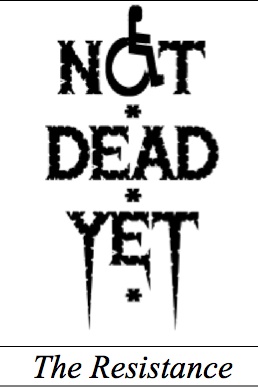 In 2011, Compassion and Choices (C&C) published a newsletter claiming that “Key Disability Rights Leaders” support assisted suicide. The only “disability organization” to support assisted suicide is Autonomy, Inc., which was formed as a chapter of Compassion in Dying.
In 2011, Compassion and Choices (C&C) published a newsletter claiming that “Key Disability Rights Leaders” support assisted suicide. The only “disability organization” to support assisted suicide is Autonomy, Inc., which was formed as a chapter of Compassion in Dying.
This is Not Dead Yet’s response to yet another C&C Con Job. All of the national disability rights organizations that have taken a position on assisted suicide oppose it. They are listed below, along with the statements of REAL LEADERS OF THE DISABILITY RIGHTS MOVEMENT.

Bob Kafka, ADAPT
Seniors and people with disabilities who need assistance to do everyday tasks like dressing and bathing want the choice to get those services at home and to have control over how the services are delivered. They do not want to be forced into a nursing facility, nor see themselves and their spouse, and sometimes their children, forced to live in poverty to qualify for help with such basics.
Unfortunately, that choice is not a reality for most. In states which have legalized assisted suicide, according to data from Oregon, over a third of those who request assistance to die do so because of “feelings of being a burden” and over 90% cite “loss of autonomy” as a factor. If the only alternative to death that those in power offer people who require assistance is poverty and segregation in nursing facilities, then it makes no sense to talk about assisted suicide as a “choice”. Society is failing to ensure that seniors and people with disabilities have access to consumer controlled long term services and supports when they need them. The last thing we need is for those in power to make a public policy choice, during this time of vast budget cuts in Medicaid health and long term care, that an early death is the cost saving answer to these very real human needs.
National Disability Organizations That Oppose Legalization of Assisted Suicide
- ADAPT (American Disabled for Attendant Programs Today)
- Assn of Programs for Rural Independent Living
- Autistic Self Advocacy Network
- Disability Rights Education and Defense Fund
- Justice For All
- National Council on Disability
- National Council on Independent Living
- National Spinal Cord Injury Association
- Not Dead Yet
- TASH
- The World Association of Persons with Disabilities
- The World Institute on Disability

Marilyn Golden, Senior Policy Analyst, Disability Rights Education & Defense Fund
As a person with a disability and a wheelchair-user, I’m proud that the disability community has overwhelmingly opposed the legalization of assisted suicide. It’s a deadly mix with our broken, profit-driven health care system, where financial pressures already play far too great a role. Direct coercion is not even necessary. If insurers deny, or even merely delay, approval of expensive, life-giving treatments, patients will, in effect, be steered toward assisted suicide, if it is legal.
Contrary to the claims of its supporters, it would radically decrease, not increase, individual self-determination, due to the significant risk of abuse. It poses substantial danger to people with disabilities and many other people in vulnerable circumstances. For example, people with psychiatric disabilities and depression are given lethal drugs in Oregon, despite the claims of proponents that these conditions disqualify a person. Elder abuse is a growing but still largely unreported reality that threatens to pressure seniors toward an early death. Moreover, the supposed safeguards in the Oregon and Washington State laws don’t really protect patients. If one’s doctor refuses lethal drugs, the patient or family can—and do—simply shop for another doctor. And nothing in the law can protect patients when family pressures, financial or emotional, distort patient choice.

Kelly Buckland, Executive Director, National Council on Independent Living
If assisted suicide had been legal in the past, even if it were supposedly only for those with “terminal” conditions, many of us would not be here today. I might not be here today, and I’m grateful that assisted suicide was not legal back then, and I’m committed to keeping it that way. This is an important reason why the National Council on Independent Living opposes the legalization of assisted suicide. NCIL is a leader in the disability rights movement, our political struggle for equal rights.
And, among other things, equal rights includes equal suicide prevention.

Ari Ne’eman, President, Autistic Self Advocacy Network